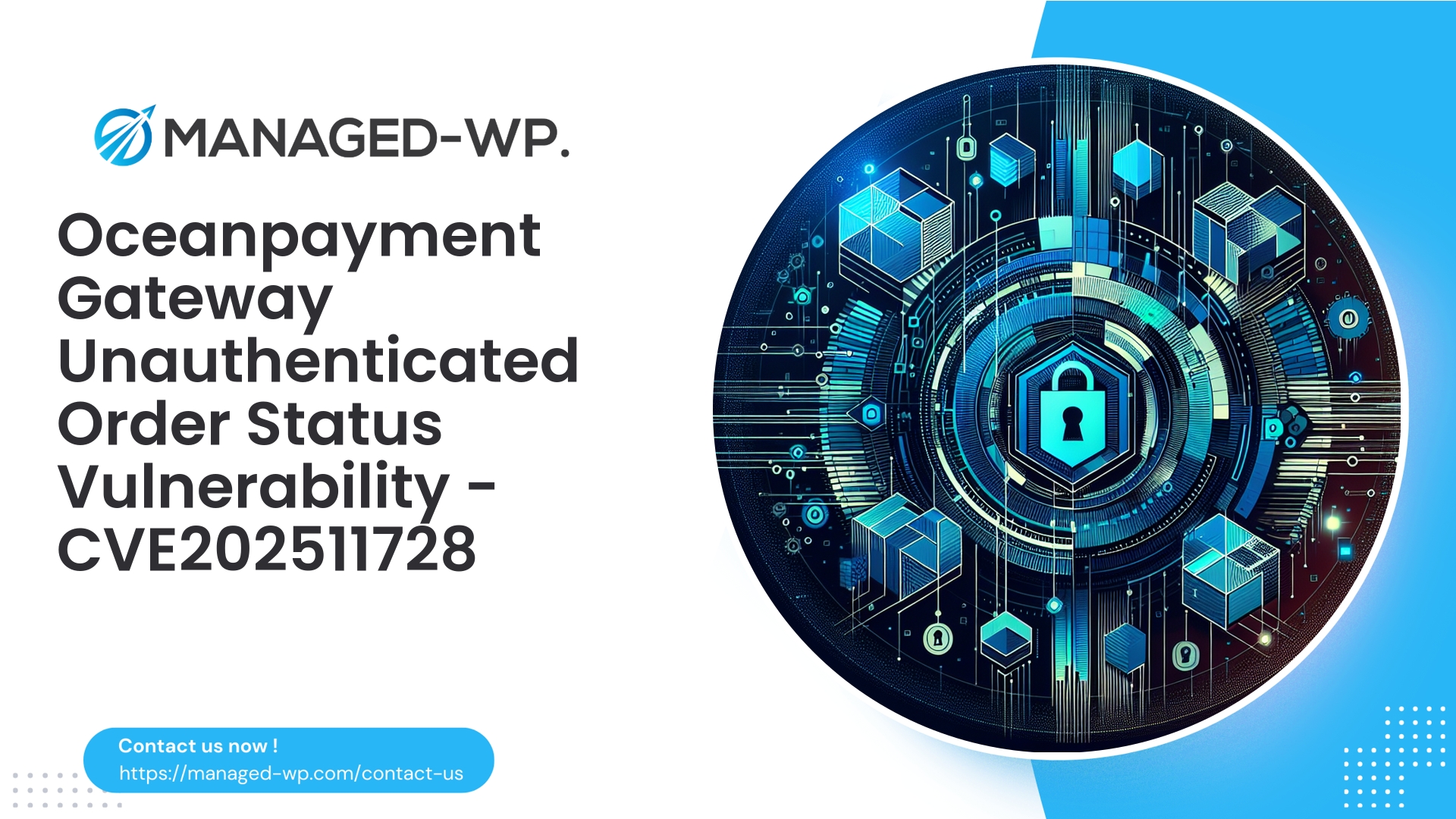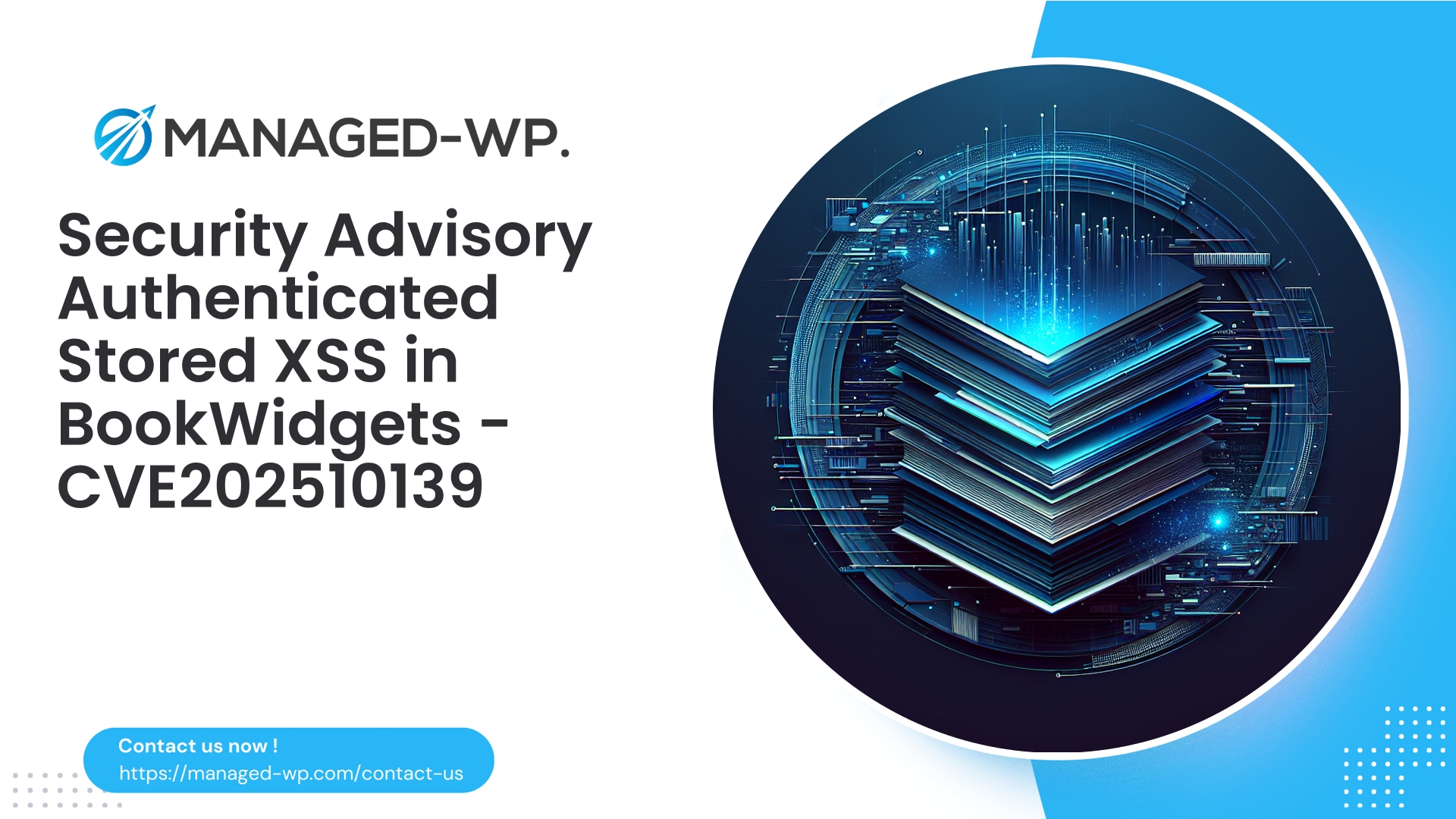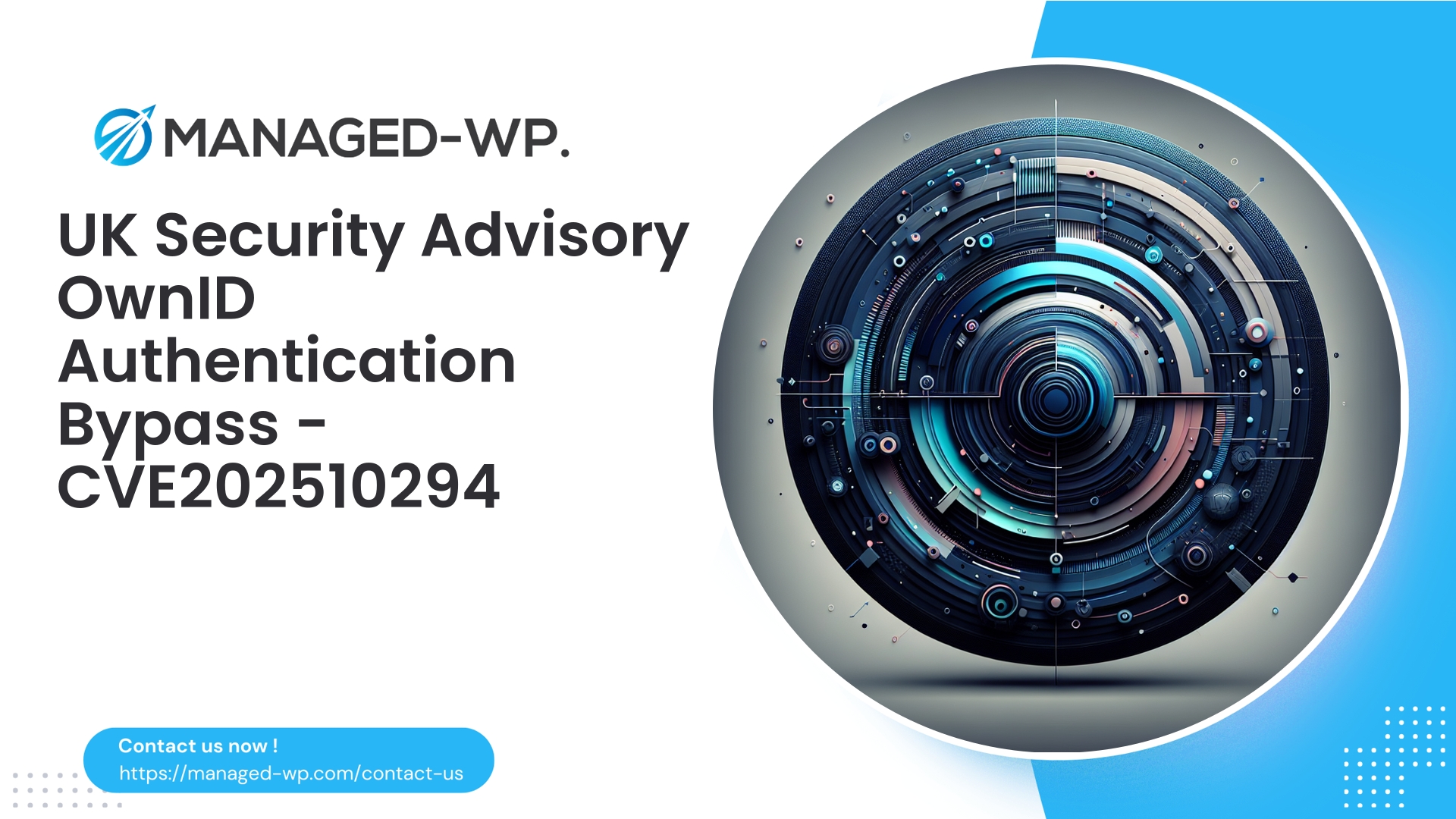| 插件名称 | Oceanpayment信用卡网关 |
|---|---|
| 漏洞类型 | 访问控制失效 |
| CVE编号 | CVE-2025-11728 |
| 紧急 | 低的 |
| CVE 发布日期 | 2025-10-15 |
| 源网址 | CVE-2025-11728 |
紧急更新:Oceanpayment信用卡网关(≤ 6.0)存在未经身份验证的订单状态更新漏洞(CVE-2025-11728)
日期: 2025年10月15日
作者: 托管 WordPress 安全团队
执行摘要
我们位于美国的安全专家团队 Managed-WP 发现了一个严重的访问控制漏洞(CVE-2025-11728,CVSS 评分 5.3),该漏洞影响 Oceanpayment CreditCard Gateway WordPress 插件的 6.0 及更低版本。该漏洞的核心在于 WooCommerce 中一个未经身份验证的端点,该端点用于处理订单状态更新。攻击者可以利用此端点非法篡改订单状态,例如错误地将订单标记为已付款或已完成,从而可能对商家造成欺诈、未经授权的订单履行以及严重的运营中断。
Managed-WP 将此类漏洞列为最高优先级。本安全公告详细介绍了技术风险、影响评估、检测指标、即时缓解策略(包括通过防火墙进行虚拟修补)、长期修复建议以及事件响应最佳实践。我们强烈建议所有网站所有者评估风险并立即采取防护措施,以保障收入来源和客户信任。
漏洞概述
- 类型: 访问控制失效——订单状态更新端点缺少身份验证。
- 受影响的插件: Oceanpayment 信用卡网关(WordPress)版本≤6.0。
- 需要身份验证: 无(允许未经身份验证的访问)。
- 影响: 无需授权即可操纵 WooCommerce 订单状态,从而导致订单欺诈和物流问题。
- CVE标识符: CVE-2025-11728
- 严重程度评分: 5.3(中等难度 - 视具体情况而定)
- 补丁状态: 发布时尚无官方补丁;建议采取缓解措施。
重要的: 具体的参数名称和端点 URL 可能因安装或自定义而异,但受影响的版本中存在的基本漏洞是一致的:回调/webhook URL 会在未验证调用者身份的情况下更新订单状态。
为什么这种漏洞需要引起重视
虽然表面上看这似乎是一个小问题,但对电子商务运营的实际后果可能很严重:
- 订单可能被欺诈性地标记为已付款或已完成,而实际上并未收到任何付款,从而导致未经授权的实物或数字产品交付。
- 合法订单可能会被标记为已取消、已退款或已失败,从而导致库存差异和运营混乱。
- 根据订单状态触发的自动履行工作流程可能会被操纵,导致未付款货物的发货或错误的开票。
- 攻击者可以利用此漏洞作为更广泛的欺诈计划的一部分,从而给客户支持和财务团队增加额外的工作量。
- 长期风险包括声誉损害、拒付纠纷和客户信心丧失。
影响的严重程度取决于商家的履约自动化和业务流程;即使 CVSS 评分中等,对收入和运营的风险也可能很大。
技术细节:漏洞运作方式
支付网关通常通过 Webhook 或回调请求异步通知商家支付结果。安全的实现通常包含以下保障措施:
- 通过 HMAC 签名或共享密钥验证的请求。
- 验证令牌、随机数或白名单 IP 来源检查。
- 更新订单状态前,需进行明确的权限检查和输入验证。
在 Oceanpayment 插件的易受攻击版本中,订单状态更新回调端点存在以下问题:
- 接受 POST 请求,而不验证来源的真实性。
- 不验证签名或令牌。
- 根据提供的请求参数直接更新 WooCommerce 订单状态。
例如(概念表征):
POST /?oceanpayment_notify=1 HTTP/1.1 Host: merchant-store.com Content-Type: application/x-www-form-urlencoded order_id=123&status=completed
由于没有身份验证,任何发出此请求的攻击者都可以将订单 #123 设置为已完成。
概念验证(示例)
这个简化的漏洞利用程序旨在向安全团队演示该漏洞;它并非实际可用的漏洞利用程序,仅应用于防御目的:
POST /[plugin-callback-path] HTTP/1.1 Host: victim-store.example User-Agent: curl/7.92.0 Content-Type: application/x-www-form-urlencoded order_id=456&order_status=completed&transaction_id=ATTACKER-0001
如果回调端点未受保护,无法验证此请求,攻击者就可以随意将 WooCommerce 订单标记为已完成。
入侵和检测指标
网站管理员应监控以下内容:
- 订单状态意外变更为“已完成”或“处理中”,但没有相应的付款记录。
- 向引用支付网关的未知或很少使用的回调 URL 发出异常 POST 请求。
- 来自匿名或可疑 IP 地址的多次访问尝试针对插件的回调端点。
- 具有可识别的测试或攻击者模式的交易 ID(例如,“ATTACKER”、“TEST”)。
- 订单状态变更突然激增,与外部 POST 请求相关。
- 您的 Web 服务器访问日志中记录了过多或重复的 webhook POST 请求。
建议的日志搜索模式:
- 搜索包含“oceanpayment”、“notify”、“callback”或插件文件夹名称等词语的 URI。
- POST 请求体包含 order_id、status、order_status、transaction_id、out_trade_no 等参数。
用于检测异常情况的 shell 命令示例(请根据您的环境调整路径):
grep -i "oceanpayment" /var/log/nginx/access.log grep -i "callback" /var/log/apache2/access.log grep -i "order_id=" /var/log/nginx/access.log | grep "POST"
场地所有者应立即采取的缓解措施
如果您的网站使用 Oceanpayment 信用卡网关 6.0 或更早版本,请立即采取以下措施:
- 禁用或限制插件
- 如果支付网关并非至关重要,请暂时停用该插件。
- 如果停用不可行,则实施 Web 应用程序防火墙 (WAF) 规则来阻止未经身份验证的呼叫。
- 进行订单审计
- 查看近期订单是否存在可疑或异常的状态更新。
- 将支付服务商的交易日志与 WooCommerce 订单记录进行交叉核对。
- 强化回调端点
- 使用插件设置(如果可用)重命名或混淆回调 URL。
- 在回调 URL 前面添加 HTTP 基本身份验证作为临时保护措施。
- 实施 IP 过滤
- 如果已发布,则将回调请求限制为已知的网关 IP 地址。
- 启用签名验证
- 如果网关和插件支持,请配置共享密钥或 HMAC 签名验证。
- 使用 Web 应用程序防火墙虚拟补丁
- 阻止或质疑针对回调端点的未经身份验证的请求。
- 限制 webhook 端点请求速率。
- 轮换凭证
- 在实施更严格的端点保护措施后,轮换 API 密钥或共享密钥。
- 加强监测和记录
- 提高回调请求的日志详细程度,并对可疑活动立即发出警报。
托管WP推荐的WAF虚拟补丁
在官方插件补丁发布之前,紧急边界防御至关重要。Managed-WP 提倡通过专门针对此漏洞定制的 WAF 规则进行虚拟修补:
使用 ModSecurity 阻止未经身份验证的请求的示例
SecRule REQUEST_URI "@pmFromFile callback_uri_list.txt" "phase:1,deny,log,id:900100,msg:'已阻止未经身份验证的订单状态更新尝试'" SecRule REQUEST_METHOD "POST" "chain,phase:2,deny,log,id:900101,msg:'已阻止无签名 POST 订单更新'" SecRule ARGS_NAMES|ARGS|REQUEST_HEADERS:X-GW-Signature "!@validateHMAC" "t:none"
笔记: @validateHMAC 只是一个概念性配置。请根据您的环境进行调整,或使用 IP 白名单作为备选方案。
简化 ModSecurity 规则以阻止可疑参数组合
安全规则 REQUEST_METHOD "POST" "phase:2,chain,id:900102,deny,log,msg:'阻止可疑的订单状态更新尝试'" 安全规则 ARGS_NAMES "order_id|order_status|status" "chain" 安全规则 REQUEST_URI|ARGS|ARGS_NAMES "@rx (oceanpayment|ocean-pay|opay|notify|callback)" "t:none"
Nginx 回调中的临时基本身份验证
location /wp-content/plugins/oceanpayment/callback { auth_basic "Restricted"; auth_basic_user_file /etc/nginx/.htpasswd; proxy_pass http://127.0.0.1; }
Nginx规则:拒绝缺少签名标头的POST请求
location ~* /wp-content/plugins/oceanpayment/ { if ($request_method = POST) { if ($http_x_oceanpayment_signature = "") { return 403; } } try_files $uri $uri/ /index.php?$args; }
托管式 WP 检测签名概念
- 匹配指向插件回调 URL 的 POST 请求,参数为 order_id 和 status/order_status,但缺少签名标头。
- 阻止、记录、发送管理员警报。
阻止规则:条件:方法 == POST 且 (uri 匹配 /oceanpayment|ocean-pay|opay|notify|callback/) 且 (body 包含 "order_id" 且 (body 包含 "status" 或 "order_status")) 且标头不存在 "X-Oceanpayment-Signature" 操作:阻止、记录、提醒管理员
开发者指南:安全 Webhook 处理程序示例
维护自定义端点或更新插件的开发者应使用 HMAC 验证来实现签名验证。以下是一个 PHP 代码片段示例:
add_order_note('已验证付款 webhook。正在将状态更新为' . $status); $order->update_status($status, '通过已验证的 Oceanpayment 回调更新状态。'); http_response_code(200); ?>
安全提示: 使用恒定时间比较(哈希等于用于 HMAC 验证。不要依赖 HTTP Referer 或 User-Agent 标头来保证安全。记录所有更新以进行审计跟踪。
推荐给插件作者的长期补救措施
插件维护者必须:
- 验证所有 webhook 请求:
- 使用共享密钥实现HMAC签名验证。
- 或者,可以使用一次性令牌或双向 TLS 身份验证。
- 安全的API端点:
- 使用 WordPress REST API 或 admin-ajax,并具备强大的权限回调功能。
- 确保公共 AJAX 端点不允许未经身份验证的订单更新。
- 对输入数据进行清理和验证:
- 严格验证订单 ID 和已接受的订单状态值。
- 将可接受的状态列入白名单;正确映射外部值。
- 审计日志记录和警报:
- 记录所有 webhook 请求和更改。
- 提供管理员面板,显示最新的 webhook 活动及验证信息。
- IP地址白名单:
- 允许商家指定回调的允许 IP 地址范围。
- 故障安全设计:
- 拒绝或忽略未通过身份验证或确认的更新。
- 发布安全公告:
- 清晰地传达修复方案,并及时发布补丁。
- 提供临时缓解措施指导。
事件响应检查表
- 遏制:
- 立即限制或禁用回调端点访问。
- 在可行的情况下暂停自动履行工作流程。
- 评估:
- 找出可疑订单并核对付款情况。
- 缓解和清理:
- 取消或退款欺诈订单,并停止履行订单。
- 轮换暴露的密钥和 API 密钥。
- 一旦有更新可用,就给插件打补丁。
- 恢复:
- 恢复受损订单的可信备份。
- 核对账目和库存。
- 通知:
- 按要求告知客户并遵守数据泄露法规。
- 硬化与死后:
- 实施开发者修复。
- 加强监控和警报系统。
- 记录经验教训并更新安全策略。
日志记录和监控建议
- 启用支付回调端点的详细日志,保留期限至少为 90 天。
- 设置警报,提醒用户注意异常的 POST 请求量或未经付款验证的可疑订单状态转换。
- 仔细记录 webhook 元数据和签名,但不要包含敏感的信用卡数据。
- 维护 WAF 日志并与订单事件关联,以便进行全面的事件分析。
Managed-WP 的虚拟补丁为何如此重要
在插件发布修复程序之前,Managed-WP 的 Web 应用程序防火墙可提供关键的边界防御:
- 阻止未经授权的更改订单状态的尝试。
- 强制要求签名头存在或限制对受信任 IP 地址范围的访问。
- 限制请求速率并质疑可疑的客户请求。
- 立即在所有 Managed-WP 客户中部署保护规则。
我们的团队可以快速部署定制的虚拟补丁,在官方修复程序发布之前,确保您的网站安全无虞。
部署实用规则示例(先测试)
- 阻止向未签名标头的回调发送 POST 请求 (ModSecurity 示例):
SecRule REQUEST_METHOD "POST" "phase:2,chain,deny,status:403,msg:'Blocked callback without signature',id:910001" SecRule REQUEST_HEADERS:X-Oceanpayment-Signature "!@rx .+"
- 拒绝未经授权的设置订单状态的尝试:
SecRule ARGS:order_status "@rx ^(completed|processing|paid)$" "phase:2,deny,id:910002,msg:'拒绝未认证的订单状态设置',log,chain" SecRule REQUEST_HEADERS:X-Oceanpayment-Signature "!@rx .+"
- Nginx 基本块:如果缺少签名头:
如果 ($request_method = POST) { 如果 ($http_x_oceanpayment_signature = "") { 返回 403; } }
环境风险优先级排序
- 高风险: 具有自动发货、自动生成发货标签或在订单状态更改后立即发货功能的网站必须立即采取行动。
- 中等风险: 实行人工订单审核的门店仍然面临声誉和运营损失,应尽快纠正。
- 低风险: 测试或预发布环境仍应打补丁以避免被利用。
信息披露和供应商责任
插件作者应立即:
- 公开承认漏洞并提供技术细节。
- 发布安全更新,并附上清晰的安装说明。
- 提供应急缓解建议。
- 配合事件响应工作,共享建议和日志。
- 维护变更日志,记录安全修复。
我们敦促 Oceanpayment 开发团队优先发布安全版本,实施严格的签名验证和权限回调。
常见问题解答
问: IP白名单能否保证Oceanpayment的安全回调?
一个: 网关通常会公布其 IP 地址范围,但这些地址范围可能会发生不可预测的变化。IP 地址白名单可以降低风险,但为了确保强大的安全性,应该结合签名验证机制。
问: 仅仅重命名回调端点就足够了吗?
一个: 隐藏回调路径虽然增加了攻击难度,但并不能阻止知识渊博的攻击者发现它。因此,适当的验证仍然至关重要。
问: 单靠HTTPS能否保障webhook回调的安全?
一个: HTTPS 可确保传输过程中数据的完整性和机密性,但不会验证发送者的身份。因此,诸如签名或令牌之类的额外验证必不可少。
Managed-WP 如何立即帮助保护您的网站
我们专业的安全团队为 WordPress 网站所有者提供快速的虚拟补丁和监控支持:
- 已配置防火墙规则,阻止未经身份验证的订单状态更改。
- 持续进行恶意软件扫描和完整性检查。
- 无需修改插件代码即可实现即时虚拟补丁。
- 简单的控制功能,用于调整规则,并在出现冲突时恢复规则。
我们诚邀您从我们的免费基础计划开始,该计划涵盖重要的周界保护,帮助您立即保护您的场地安全。
立即免费保护计划
标题: 立即使用 Managed-WP 基本防火墙计划(免费)保护您的商店
此免费版本提供必要的防御措施,以减少您的风险敞口,同时您也可以准备进行永久性修复:
- 具有核心WAF规则的托管防火墙。
- 支持无限吞吐量。
- 恶意软件扫描,用于检测后门和篡改。
- 针对访问控制漏洞风险的重点缓解措施。
请在此注册:
https://my.wp-firewall.com/buy/wp-firewall-free-plan/
如需增强自动化、恶意软件清除和高级功能,请考虑我们专为主动缓解和全面安全而量身定制的付费计划。
后续步骤清单(快速参考)
- 如果可能,请停用 Oceanpayment 信用卡网关(版本 ≤ 6.0)。
- 立即应用 WAF 规则,阻止未经身份验证的 POST 请求发送到回调端点。
- 审核近期订单和付款记录,查找异常情况。
- 轮换支付网关集成中使用的 API 密钥和共享密钥。
- 计划在插件更新中实施或验证长期修复方案。
- 维护详细的日志和警报,以便及时处理回拨活动。
- 注册 Managed-WP 基本防火墙计划,即可免费获得边界保护:
https://my.wp-firewall.com/buy/wp-firewall-free-plan/
如果您在部署这些防御措施时需要帮助,或者希望跨多个站点进行托管虚拟补丁,我们的 Managed-WP 安全团队随时准备为您提供帮助。请通过您的 Managed-WP 控制台联系支持团队,以便在此次事件期间获得优先支持。
保持警惕,注意安全。
托管 WordPress 安全团队



















